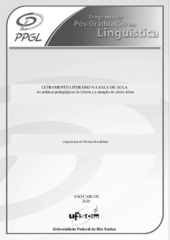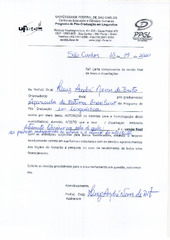| dc.contributor.author | Brasileiro, Aparecida de Fátima | |
| dc.date.accessioned | 2020-05-30T13:08:57Z | |
| dc.date.available | 2020-05-30T13:08:57Z | |
| dc.date.issued | 2020-02-19 | |
| dc.identifier.citation | BRASILEIRO, Aparecida de Fátima. Letramento literário na sala de aula: as práticas pedagógicas de leitura e a atuação do aluno leitor. 2020. Tese (Doutorado em Linguística) – Universidade Federal de São Carlos, São Carlos, 2020. Disponível em: https://repositorio.ufscar.br/handle/ufscar/12857. | * |
| dc.identifier.uri | https://repositorio.ufscar.br/handle/ufscar/12857 | |
| dc.description.abstract | This research brings the result of the investigation of Pedagogical Practices of Literary Reading and the performance of the student/reader in a state public school of Guanambi (BA). As a theoretical framework, the research used the concepts of literacy centered on Street and Soares from an ideological perspective; Barton & Hamilton, using the notions of literacy practices and literacy events, especially the reflections of literary literacy studies of Cosson and Paulino; literature teaching reflected by Zilberman, Todorov, Marisa Lajolo; literary reader discussed by Lena Lois, Piglia and Michèle Petit. As a complementary support, this research was guided by the concepts of Marcia Abreu, Neide Rezende, Dalvi, among others. The problem led this thesis to the following question: how are the pedagogical practices of literary reading mediated and how is the performance of high school students/readers during the development of methodological practices of literary reading? To look for an answer for this investigation, it was defined as a qualitative research, based on ethnography as a methodological basis, to verify how the daily life of the classroom was configured, both in the teaching activities of the subject Portuguese and Brazilian Literature in the 1st, 2nd and 3rd grades of high school, and in the reader's positioning when facing these practices. The corpus of the study comprised data collection through the analysis and interpretation of course syllabus, class observation, interview with three teachers and questionnaire with thirteen students, and the data were described, analyzed and interpreted. The data contributed to the reflection about the teaching mediation and the reader performance in the literary pedagogical spheres, in their varied supports and educational propositions. It was found that there is a diversity of Pedagogical Practices of Literary Reading, not consisting of rules to be followed, but of constructions in accord with the reality of the teaching context. This multiplicity demonstrated a dialogical relationship among the teaching community and encouraged the reader's performance. This performance was frequent, even non-literary readers made use of Reading Simulation Strategies to demonstrate their performance. As a result, it was verified the need to take the data to be reflected with the educators, in order to encourage the research about the reader and to promote mediation practices that allow the discursive exchange and the reflection about the teaching-learning process. | eng |
| dc.description.sponsorship | Não recebi financiamento | por |
| dc.language.iso | por | por |
| dc.publisher | Universidade Federal de São Carlos | por |
| dc.rights | Attribution-NonCommercial-NoDerivs 3.0 Brazil | * |
| dc.rights.uri | http://creativecommons.org/licenses/by-nc-nd/3.0/br/ | * |
| dc.subject | Prática pedagógica de leitura literária | por |
| dc.subject | Mediação docente | por |
| dc.subject | Atuação do leitor | por |
| dc.subject | Eventos de letramento | por |
| dc.subject | Letramento literário | por |
| dc.subject | Pedagogical Practice of Literary Reading | eng |
| dc.subject | Teaching Mediation | eng |
| dc.subject | Reader Performance | eng |
| dc.subject | Literacy Events | eng |
| dc.subject | Literary Literacy | eng |
| dc.title | Letramento literário na sala de aula: as práticas pedagógicas de leitura e a atuação do aluno leitor | por |
| dc.title.alternative | Literary literacy in the classroom: pedagogical practices of reading and the acting of the student reader | eng |
| dc.type | Tese | por |
| dc.contributor.advisor1 | Brito, Luiz André Neves de | |
| dc.contributor.advisor1Lattes | http://lattes.cnpq.br/6863292359239733 | por |
| dc.description.resumo | Esta pesquisa traz o resultado da investigação de Práticas Pedagógicas de Leitura Literária e da atuação do aluno/leitor em uma escola pública estadual de Guanambi (BA). Como referencial teórico, a pesquisa fez uso dos conceitos de letramento centrados em Street e Soares numa perspectiva ideológica; Barton & Hamilton, mobilizando as noções de práticas de letramento e de eventos de letramento, sobretudo as reflexões dos estudos de letramento literário abordados por Cosson e Paulino; ensino de literatura refletido por Zilberman, Todorov, Marisa Lajolo; leitor literário discutido por Lena Lois, Piglia, Michèle Petit. Como suporte complementar, esta pesquisa foi guiada pelos conceitos de Márcia Abreu, Neide Rezende, Dalvi, dentre outros. A problemática direcionou esta tese para a seguinte indagação: de que forma as práticas pedagógicas de leitura literária são mediadas e como se configura a atuação dos alunos/leitores do Ensino Médio durante o desenvolvimento das práticas metodológicas de leitura literária? Para buscar uma resposta para essa investigação, tratou-se de uma pesquisa qualitativa, tomando como base metodológica a etnografia, para verificar como o cotidiano da sala de aula se configurou, tanto nas atividades docentes da disciplina Língua Portuguesa e Literatura Brasileira nas turmas do 1º, 2º e 3º ano do Ensino Médio, quanto no posicionamento do leitor ao se deparar com essas práticas. O corpus do trabalho compreendeu uma coleta de dados por meio da análise e interpretação dos planos de curso, de observações das aulas, de entrevistas com três professoras e questionários com treze alunos, sendo os dados descritos, analisados e interpretados. Os dados contribuíram para a reflexão sobre mediação docente e da atuação do leitor nas esferas pedagógicas literárias, em seus variados suportes e proposições educacionais. Verificou-se que há uma diversidade de Práticas Pedagógicas de Leitura Literária, não consistindo em prescrições a serem seguidas, mas sim em construções condizentes com a realidade do contexto de ensino. Essa multiplicidade demonstrou uma relação dialógica entre a comunidade de ensino e promoveu o incentivo à atuação do leitor. Essa atuação foi constante, mesmo os não leitores literários faziam uso de Estratégias de Simulação de Leitura para demonstrar a sua atuação. Como resultado, verificou-se a necessidade de levar os dados para serem refletidos com os educadores, a fim de incentivar a pesquisa sobre o leitor e promover práticas de mediação que oportunizem a troca discursiva e a reflexão a respeito do processo de ensino-aprendizagem. | por |
| dc.publisher.initials | UFSCar | por |
| dc.publisher.program | Programa de Pós-Graduação em Linguística - PPGL | por |
| dc.subject.cnpq | LINGUISTICA, LETRAS E ARTES::ARTES | por |
| dc.publisher.address | Câmpus São Carlos | por |
| dc.contributor.authorlattes | http://lattes.cnpq.br/6891740898180014 | por |


